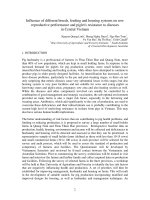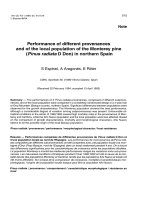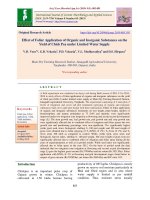Assess the performance of different breeds under backyard poultry farming system in Erode district, India
Bạn đang xem bản rút gọn của tài liệu. Xem và tải ngay bản đầy đủ của tài liệu tại đây (169.46 KB, 4 trang )
Int.J.Curr.Microbiol.App.Sci (2019) 8(9): 1138-1141
International Journal of Current Microbiology and Applied Sciences
ISSN: 2319-7706 Volume 8 Number 09 (2019)
Journal homepage:
Original Research Article
/>
Assess the Performance of Different Breeds under Backyard Poultry
Farming System in Erode District, India
S. Vinothraj1*, P. Alagesan2 and M. Siva2
1
Department of Animal Science, 2Department of Home Science, ICAR- Krishi Vigyan Kendra
(MYRADA), Erode District, TamilNadu-638453, India
*Corresponding author
ABSTRACT
Keywords
Body weight, Desi
chickens, Egg
production,
Mortality,
Gramapriya,
Srinidhi
Article Info
Accepted:
20 August 2019
Available Online:
10 September 2019
A study was conducted to assess the Performance of Different Breeds
which includes Gramapriya, TANUVAS Aseel and Srinidhi under
Backyard Poultry farming System in Erode district by covering 30
backyard poultry farmers in T.N.Palayam, Gobi and Anthiyur block of
Erode district, Tamil Nadu. Information was obtained on mean body weight
at various ages, age at first egg, annual egg production and mortality rate.
The result indicated that Gramapriya showed better annual egg production
and Srinidhi gained better body weight at 20 th week when compared to
other strains. Even though the two strains performed well in productivity,
TANUVAS Aseel is suitable for backyard farming system due its better
farmers adoption due its external appearance and genetic potentiality.
Attempts were taken in 2018-19 to link the results of the strain assessment
to the mainstream extension at the district for larger adoption of rural
communities.
Introduction
Backyard poultry production is an old age
profession of rural families of India. It is the
most potent source for subsidiary incomes for
landless and poor farmers. It is an enterprise
with low initial investment but higher
economic returns and can easily be managed
by women, children and old aged persons of
the households.
Now-a-days, poultry meat and eggs have been
the best and cheapest sources for meeting out
the per capita requirement of protein and
1138
Int.J.Curr.Microbiol.App.Sci (2019) 8(9): 1138-1141
energy for rural areas of India. Though India
has shown a tremendous growth in poultry
production over decades but rural poultry
farming is still lagging behind and always
found neglected. As it is the best alternative
for
the
small
scale farmers
to
subsidies the income with negligible input,
this farming system needs an upliftment with
newly developed varieties of chicken. Rural
farmers usually rear desi type chicken having
low egg and meat production potential. Most
of the backyard poultry production comprises
of rearing indigenous birds with poor
production performances (Pathak and Nath,
2013; Chakravarthi et al.,., 2014; Reetha et
al.,., 2016; Patra and Singh, 2016). However,
over the period of time improved strains have
been
introduced
by
extension
and
development
agencies.
Development
organizations under government of India have
developed improved strains like Gramapriya,
TANUVAS Aseel and Srinidhi.
Materials and Methods
Gramapriya is a multicolored egg purpose
chicken variety developed at Directorate of
Poultry Research, Hyderabad for free range
and rural backyard rearing. TANUVAS Aseel
is a new variety of native chicken developed
at Poultry Research Station, TANUVAS.
Srinidhi is a dual purpose chicken variety
developed at Directorate of Poultry Research,
Hyderabad.
The KVK Scientist made regular visit to
farmer’s field and observed production
parameters.
The present study was conducted in the Erode
district situated between 10-35' and 11-60' of
north latitude and 76.49' and 77.58' of East
longitude and 171-91' meters above the mean
sea level. The river Cauvery flows on the
north and eastern part of the District. Erode
town sweats under very hot spells during
summer. The study was carried out in Gobi,
T.N. Palayam and Anthiyur blocks of Erode
district of Tamil Nadu during 2018-2019.
The selected Poultry farmers were trained on
all scientific Desi bird training techniques like
brooding, deworming, Vacciantion etc. Each
farmer supported with of 30 unsexed day old
chicks which includes 10 Gramapriya chicks,
10 TANUVAS Aseel Chicks and 10 Srinidhi
Chicks. There improved strains compared
compared with farmers traditional breeds in
this study.
The following production parameters were
studied
Mortality percentage 0-12 weeks
Body weight at 12 th week age (Kg)
By understanding the potentiality of the above
strains KVK conducted an OFT in 2018-2019
to assess its suitability and performance in the
backyard farming system to feed into the
mainstream extension. This paper is based an
results of the OFT conducted by ICAR, KVK
MYRADA with the following objectives.
To study body weight at different ages. To
find out the age at egg laying of this particular
study. To assess the annual egg production .
To study the mortality rate and also to
identify the farmers adoptability.
Body weight at 20 th week age (Kg)
Average annual egg production
Average age at first egg
Simple percentage analysis was used to
analyze the data.
Results and Discussion
The production parameters of these improved
1139
Int.J.Curr.Microbiol.App.Sci (2019) 8(9): 1138-1141
strains of chicken are presented in Table.1
Annual Average Egg production
Mortality Percentage (0-12 Weeks)
Egg production determining the success of
Poultry enterprises and gaining better income
to farmers. Comparative estimate of egg
production revealed that Gramapriya has
higher annual egg production (182 eggs)
when compared to other two strains. The
variation in egg production might be due to
genetic potential of Native and improved
varieties of Chicken. Karuna sree et al.,
(2017), who reported egg production (178
eggs / year) of Gramapriya, has similar results
of the present study.
Higher mortality rate were recorded in
improved strain than desi chicks during the
early part of the life (0-12 Weeks). The reason
for lower mortality in desi chicks might be
due to more adaptability to the environment
and proper brooding by their mother.
Body weight at 20 th week
The body weight at 20 th week is a factor
which ensure the market value of the birds in
the present study. Srinidhi attained better
body weight & 20 th week (1.6 Kg) when
compared to other two strains. The present
findings were in accordance with findings of
Sharma et al.,., (2017) who reported that 20 th
week body weight of Srindhi birds under
backyard system of poultry rearing was 1.68
Kg.
Age at First egg
TANUVAS Aseel started to lay egg at 155
days of age but Gramapriya and Srinidhi
started to lay eggs at 162 days and 188 days
respectively.
Table.1Comparative performance of Gramapriya, TANUVAS Aseel and Srinidhi under
backyard system of rearing
S. No Particulars
1.
2.
3.
4.
Farmers practice
Gramapriya
TANUVAS Aseel
Srinidhi
Mortality
Body weight Body weight Average age
percentage
at 12 th
at 20 th
at egg
(0-12 Weeks)
week
week
laying
(Days)
2
5.8
8.2
7.9
0.89 Kg
1.11 Kg
1.02 Kg
1.1 Kg
From the study, it can be concluded that
Gramapriya and Srinidhi birds performs better
than TANUVAS Aseel chicken in terms of
annual egg production and body weight under
backyard system of rearing, But TANUVAS
Aseel breed had better market opportunity
and farmers adoption due its external
appearance and genetic potentiality. So,
farmers from rural areas of Erode district can
1.24 Kg
1.54 Kg
1.38 Kg
1.60 Kg
194
162
155
188
Annual
average egg
production
70
182
151
150
rear TANUVAS Aseel for their livelihood
and nutritional security.
References
Pathak PK and Nath BG. Rural Poultry
Farming with Improved Breed of
Backyard Chicken. Journal of
World‟s Poultry Research, 2013; 3
1140
Int.J.Curr.Microbiol.App.Sci (2019) 8(9): 1138-1141
(1): 24-273.
Chakravarthy PV, Mohan B and Senthilkumar
K. Performance of CARI Nirbheek
(Aseel Cross) birds reared under
intensive and semi intensive system in
Namakkal District. Indian Veterinary
Journal, 2014; 91(11): 85-87.
Patra, J and Singh DV (2016). Backyard
poultry
farming,
a
suitable
Intervention for Tribal people for their
livelihood support and Nutritional
security. International Journal of
Humanities and Social Science
Innovation, 2016; 5(6): 22-26
Reetha TL, Rajeswar JJ, Harikrishnan TJ,
Sukumar
K,
Srinivasan
P,
Kirubakaran JJ (2016) Studies on the
effectiveness of oral pellet vaccine in
improving egg production and egg
quality in desi chicken. Veterinary
World, 2016 ; 9 (8): 900-903.
Karuna sree E, Vijaya Nirmala T and Reddy
RVSK. Comparative performance of
different varieties of chicken under
backyard system of rearing in tribal
and rural areas of West Godavari
district, A.P. International Journal of
Science,
Enviro
nment
and
Technology, 2017; 6(2) : 1100 – 1104
Sarma M, Islam R, Borah MK, Sharma P,
Mahanta
JD,
Kalita
N
and
Bhattacharyya
BN.
Comparative
performance of Vanaraja, Srinidhi and
Desi chicken under traditional system
among tribal community of Assam
Comparative performance of Vanaraja,
Srinidhi and Desi chicken under
traditional
system
among
tribal
community of Assam. Indian Journal of
Animal Research, 2017; B-3391:1-3
How to cite this article:
Vinothraj, S., P. Alagesan and Siva, M.. 2019. Assess the Performance of Different Breeds
under Backyard Poultry Farming System in Erode District. Int.J.Curr.Microbiol.App.Sci. 8(09):
1138-1141. doi: />
1141









